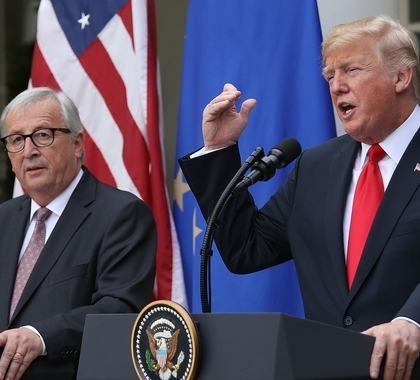It was amusing, yesterday, to see the President of the United States with his counter-part from the EU, a Luxembourgian.
Luxembourg is a tiny country in Europe squeezed among Germany, France, Belgium and Netherlands, about the size of Frederick County, Virginia, where I live.
The existence of Luxembourg is due to an attempted division of the Holy Roman Empire, nee the Kingdom of the Franks, among successors of Charlemagne. (It’s never a good idea to attempt to divide an empire!!!)
From the Western Kingdom came France and from the Eastern Kingdom, Germany. From the Middle Kingdom came Belgium, Netherlands and Luxembourg, also Switzerland, and also Alsace-Lorraine. There is a sense in which all of the wars of Europe have since been about whether France or Germany controls the Middle Kingdom.
Notice the moniker “Holy Roman Empire.” The Pope crowned Charlemagne as Emperor, and in so doing officially shifted the locus of western Christianity from the Mediterranean to northern Europe. Later, when Constantinople fell, the locus of eastern Christianity shifted to Moscow (at least, this is the Russian version of history).
While the Roman Empire was defined by the Mediterranean, conducive to trade especially with Egypt, the relocation of both western and eastern Christianity northward was forced by the Mediterranean becoming a border between Christianity and Islam. Eventually, western Europe looked to the Atlantic as a possible trade route to China, either directly to the west or to the south, around Africa.
Fast forward to the present: The EU represents an attempt by France and Germany to re-unite Europe, with France’s ambition more political, and Germany’s more economic. They talk about the EU as ending the incessant wars that have characterized Europe, something we, in the US, don’t really understand. We tend to think that wars are ended by the spread of democracy and the value that underlie democracy.
For the Germans, the EU features free trade internally and the opportunity for managed trade with the rest of the world. That is, the EU has a common external border, and is as much about “trade diversion” as much as it is about “trade expansion.” Trade agreements negotiated with the EU involve a mix of liberalization and control, as were included in the outlines of an agreement between the U.S. and the EU discussed yesterday.
The end of the Cold War may have removed a clash of political ideology between East and West, and restored the centuries old conflicts, economic, cultural and geopolitical, between east and west and within the west.





